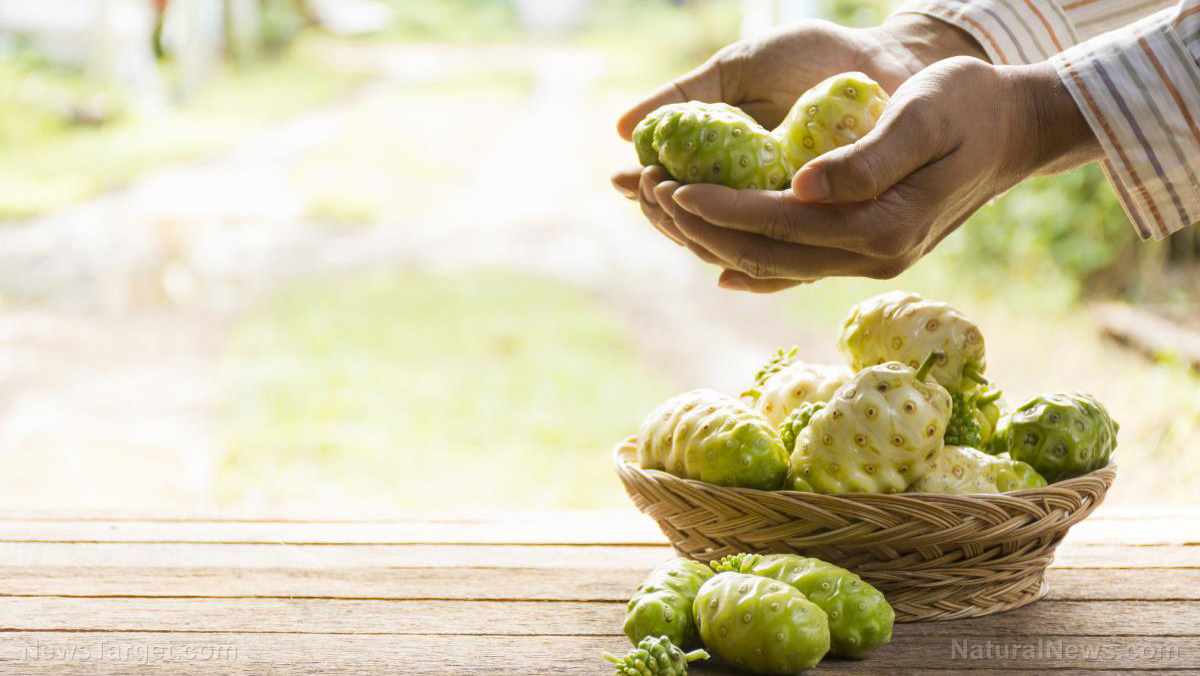
For this reason, modern research is beginning to explore the realm of natural medicine for potent herbs, fungi and medicinal plants that might be utilized for creating cancer treatments that cause neither side effects nor further cellular damage.
Noni, a potent cancer-fighting plant
One plant that’s fast emerging as a potent cancer-fighting agent is noni (Morinda citrifolia). Noni is a small tropical tree endemic to Australia and Southeast Asian countries. It thrives best in dark volcanic soil, often being found among solidified chunks of lava.
As a traditional food plant, noni has been used for millennia for both culinary and medicinal purposes. Historically, many parts of the noni tree had been used alone or alongside other herbs to treat inflammation and combat the onset of chronic conditions.
Recently, preliminary research has found that noni is also capable of fighting lung cancer cells and inhibiting tumor formation. A team of scientists from the Universiti Putra Malaysia demonstrated that noni leaf extract stalled metastasis in vitro.
The noni leaf extract also caused no harmful side effects on normal lung cells, unlike mainstream chemotherapeutic drugs. In addition, the extract helped boost antioxidant response to oxidative stress and suppressed inflammation in lung cancer tissues.
To further examine the extract's cancer-fighting properties, the team tested noni leaf extract against erlotinib, a chemotherapeutic drug often used in the treatment of non-small cell lung cancer (NSCLC), in vivo.
It appeared that noni leaf extract is more potent in inducing programmed cell death on NSCLS cells than erlotinib. The extract did not affect normal lung cells, nor did it cause side effects common for patients taking erlotinib.
These findings affirm that noni is a potent medicinal plant capable of stalling metastasis and neutralizing lung cancer cells. Plus, besides being more successful at fighting cancer than erlotinib, noni leaf extract does not cause harmful side effects.
Noni juice stalls tumor formation of breast cancer cells
In a 2012 article published in the Evidence-Based Complementary and Alternative Medicine, a team of researchers in the U.S. affirmed that the juice of the noni fruit resulted in reduced tumor size and longer tumor doubling time in mice.
In particular, the oral administration of noni juice stalled tumor proliferation in mice. This effect had been noticeable in tumors that are at least 1.5 centimeters in diameter.
It is important to note that tumors this size are considered characteristic of stage 1 breast cancer, the earliest stage of the disease. In this stage, cancer is noticeable, and the cancer cells can be found in limited areas. Breast cancer is also the most treatable during this stage.
That being said, the team cautioned that noni juice did not appear to reduce the risk of breast cancer. Therefore, patients taking it for its other benefits can expect neither an increased nor reduced risk of breast cancer.
Other reported health benefits of noni
Besides its cancer-fighting properties, the noni tree has also been reported to offer other health benefits, including better blood pressure control and stronger immune health. Existing studies also affirm that certain compounds in noni possess anti-diabetic properties.
Preclinical studies on noni extracts and its constituents demonstrate that the plant has antibacterial, antifungal and antioxidant properties, among others. Noni has also been found to reduce cholesterol, thus supporting heart health.
Noni is a medicinal plant that exhibits potential as a safe and potent treatment for lung cancer. (Related: Quercetin, the active compound in Yang-Yin-Qing-Fei-Tang, found to inhibit lung cancer.)
Consult a healthcare professional if considering using noni to treat cancer, diabetes, high blood pressure and other conditions it is reported to be potent against.
Read more articles about the health benefits of noni and other medicinal plants at NaturalMedicine.news.
Sources include:
Please contact us for more information.























